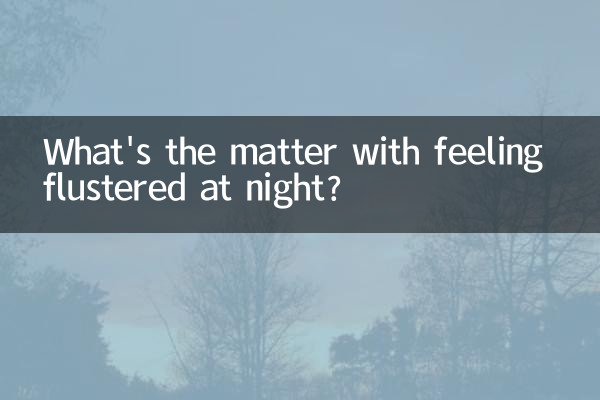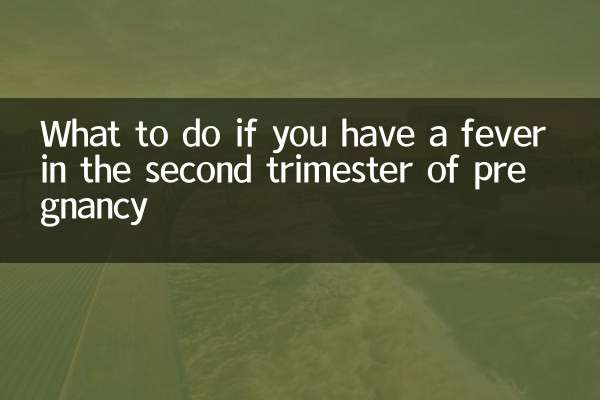What's the matter with feeling flustered at night?
In the past 10 days, the topic of "night palpitations" has triggered extensive discussions on major health forums and social media. Many netizens shared their experiences of panic and anxiety at night and sought solutions. This article will combine the hot search data and medical knowledge on the Internet to analyze the possible causes and countermeasures of palpitations at night.
1. Data statistics on popular health topics across the Internet in the past 10 days

| Ranking | topic | Search volume (10,000) | Main discussion platform |
|---|---|---|---|
| 1 | Flustered and insomnia at night | 45.6 | Weibo, Zhihu, Baidu |
| 2 | Anxiety attacks at night | 32.1 | Xiaohongshu, Douban |
| 3 | Causes of palpitation and chest tightness | 28.7 | Douyin, Kuaishou |
| 4 | Caffeine and heart palpitations | 25.3 | Station B, WeChat public account |
| 5 | Nighttime symptoms of menopause | 18.9 | Women's Health APP |
2. Analysis of common causes of palpitations at night
According to discussions between medical experts and netizens, palpitations at night may be caused by the following factors:
| Cause classification | Specific performance | Proportion |
|---|---|---|
| psychological factors | Anxiety, stress, post-traumatic stress disorder | 38% |
| living habits | Excessive caffeine intake, overeating dinner, staying up late | 25% |
| physiological factors | Hypoglycemia, hyperthyroidism, menopause | 22% |
| heart problems | Arrhythmia, myocardial ischemia | 15% |
3. Answers to the 5 questions that netizens are most concerned about
1.Why am I more likely to panic at night than during the day?
The environment is quiet at night, and body perception is more sensitive; parasympathetic nerve activity may amplify discomfort; lying down posture changes the load on the heart.
2.What are the signs that you need immediate medical attention when you have panic attacks?
Accompanied by chest pain, difficulty breathing, and confusion; lasting more than 30 minutes; occurring more than 3 times a week.
3.How to differentiate between anxiety palpitation and heart disease?
Anxiety palpitation is mostly related to emotions and is relieved after activity; palpitation caused by heart disease is often related to physical activity and may be accompanied by other symptoms.
4.Home remedies to quickly relieve panic attacks
Practice deep breathing (4-7-8 breathing method), apply cold water on your face, drink warm water, and listen to soothing music.
5.long term preventive measures
Maintain a regular schedule, limit caffeine, exercise moderately, and practice mindfulness meditation.
4. Professional doctor’s advice
Professor Wang from the Department of Cardiology at Peking Union Medical College Hospital pointed out: "In the recent outpatient clinics, the number of patients seeking treatment for night palpitations has increased by about 20%, most of which are related to the psychological stress after the epidemic. It is recommended to conduct 24-hour electrocardiogram monitoring to rule out organic diseases and evaluate the psychological state at the same time."
Director Li of the Shanghai Mental Health Center reminded: "Nighttime palpitations may be the first symptom of anxiety disorders. Especially when accompanied by sleep disorders, you should see a psychology department as soon as possible."
5. Sharing of real cases from netizens
| age | Symptom description | final diagnosis | Solution |
|---|---|---|---|
| 28 years old | Rapid heartbeat for 1 hour before falling asleep | caffeine sensitivity | Skip afternoon tea |
| 42 years old | Waking up with panic at 3-4am | anxiety disorder | cognitive behavioral therapy |
| 55 years old | Chest tightness and palpitations when lying down | mild myocardial ischemia | Drug + exercise therapy |
6. Summary and suggestions
Night palpitations are a common symptom that cannot be ignored and may involve multiple physical and psychological factors. Suggestions:
1. Record attack time, frequency and triggers
2. Conduct basic physical examination (electrocardiogram, thyroid function, etc.)
3. Adjust lifestyle and observe for 2-4 weeks
4. If there is no improvement or worsening, seek medical attention promptly for investigation.
Remember, most nighttime palpitations are not serious illnesses, but proper diagnosis and treatment can significantly improve your quality of life. Maintain a good routine and learn to manage stress so that you no longer feel flustered at night.

check the details

check the details